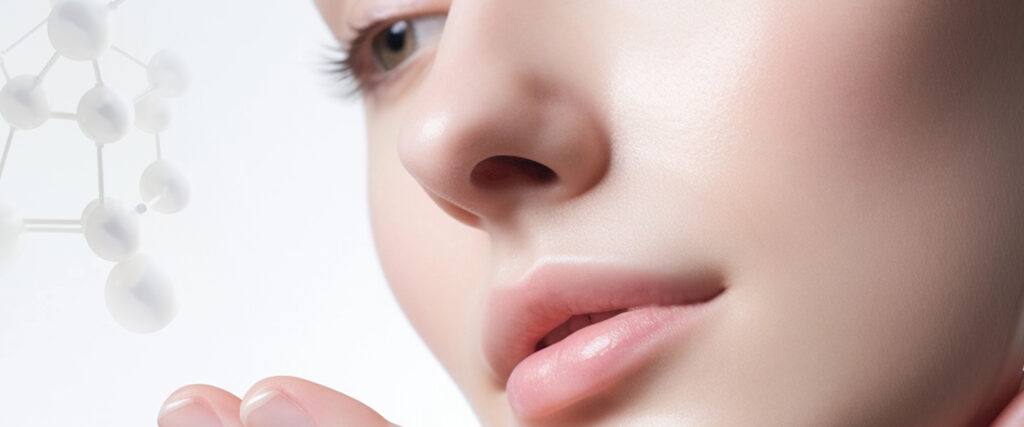Our skin is the largest organ of the body, serving as a protective barrier against external elements and playing a crucial role in maintaining overall health. While skincare routines and topical treatments are often in the spotlight, the significance of proper nutrition in promoting healthy skin is frequently underestimated. A lack of essential nutrients can have profound effects on the skin, leading to various issues that extend beyond mere cosmetic concerns.
- ∙ Collagen and Elasticity:
Collagen, a structural protein, is vital for maintaining the skin’s firmness and elasticity. Inadequate nutrition, particularly a deficiency in vitamin C, can impede collagen production, resulting in sagging skin and the formation of fine lines and wrinkles. Incorporating vitamin C-rich foods, such as citrus fruits and leafy greens, is essential for promoting collagen synthesis and preserving skin elasticity[1].
∙ Hydration and Moisture Balance:
Proper hydration is a cornerstone of healthy skin. Dehydration can make the skin appear dull, dry, and flaky, emphasizing the need for adequate water intake. Additionally, omega-3 fatty acids found in fish, flaxseeds, and walnuts contribute to the skin’s lipid barrier, preventing moisture loss and maintaining a healthy, radiant complexion[2].
∙ Inflammation and Acne:
Diet plays a significant role in managing inflammation, a common factor in various skin conditions, including acne. Foods high in refined sugars and saturated fats can trigger inflammation and exacerbating acne symptoms. A diet rich in antioxidants, such as fruits, vegetables, and green tea, helps combat inflammation and supports clear, blemish-free skin[3].
∙ Nutrient Deficiencies and Skin Conditions:
Certain skin conditions are directly linked to nutrient deficiencies. For example, a lack of vitamin A may contribute to dry and rough skin, while insufficient zinc intake can lead to delayed wound healing and increased susceptibility to infections. Maintaining a balanced diet that includes a variety of nutrients is crucial for preventing such deficiencies and supporting optimal skin function[4].
∙ Sun Protection and Antioxidants:
While sunscreen is crucial for protecting the skin from harmful UV rays, nutrition also plays a role in enhancing the body’s natural defence mechanisms. Antioxidants, found in fruits, vegetables, and nuts, help neutralize free radicals generated by sun exposure, contributing to healthier and more resilient skin[5].
The skin reflects our overall health, and its appearance is deeply intertwined with our nutritional choices. A diet rich in vitamins, minerals, antioxidants, and essential fatty acids is fundamental for promoting skin health and addressing various skin concerns. Besides it, the intake of proper dietary supplements could be effective in maintaining healthy and shiny skin, whereas it is recommended to consult your physician before using any dietary supplements. As we strive for radiant and youthful skin, let us not overlook the powerful impact of a well-balanced and nutrient-rich diet in nurturing the skin from within. By understanding the connection between nutrition and skin health, we can embark on a holistic approach to skincare that goes beyond topical treatments and embraces the foundational importance of what we put into our bodies.
|
Summary of key effects of nutrients and diet in skin ageing |
|
|
Nutrients/Diet |
Relationship with the Skin |
|
Water |
Maintain skin internal balance and tissue function (e.g., ageing and inflammation) |
|
Proteins |
Constitution and repair of skin tissues (involved in protein synthesis and metabolism), mediation of skin physiological functions and supply of energy. |
|
Trace Elements |
|
|
Copper |
Involved in extracellular matrix, synthesis and stabilization of skin proteins, and angiogenesis. |
|
Zinc |
Participates in the proliferation and differentiation of epidermal keratinocytes. |
|
Iron |
Closely related to the activity of antioxidant enzymes in skin cells. |
|
Selenium |
1. Essential for the development and function of skin keratinocytes.2. Related to skin antioxidant enzyme activity. |
|
Vitamins |
|
|
VA |
Commonly used anti-ageing ingredients prevent skin ageing by regulating the expression of genes and matrix metalloproteinases. |
|
VB |
Associated with skin inflammation and pigmentation. |
|
VC |
Involved in skin collagen synthesis and elimination of intracellular reactive oxygen species. |
|
VD |
Reduces skin DNA damage, inflammation, and photocarcinogenesis. |
|
VE |
Prevent skin ageing by inhibiting lipid peroxidation. |
|
Diet |
|
|
Fat |
High fat is associated with skin inflammation, essential fatty acids are involved in skin lipid synthesis and metabolism. |
|
Tobacco |
Change skin cuticle thickness, and accelerate skin pigmentation and skin necrosis. |
|
Alcohol |
Promote the proliferation of keratinocytes, change the skin permeability, destroy the barrier function of the skin, and affect the skin lipid composition. |
|
Sugar and baked goods |
Associated with skin thickness, AGEs, autophagy, and inflammation. |
|
Source: Cao C, Xiao Z, Wu Y, Ge C. Diet and Skin Aging-From the Perspective of Food Nutrition. Nutrients. 2020 Mar 24;12(3):870. doi: 10.3390/nu12030870. PMID: 32213934; PMCID: PMC7146365. |
|
Pullar JM, Carr AC, Vissers MCM. The Roles of Vitamin C in Skin Health. Nutrients. 2017 Aug 12;9(8):866. doi: 10.3390/nu9080866. PMID: 28805671; PMCID: PMC5579659.
https://angels2animals.com/best-ways-to-hydrate?gad_source=1&gclid=CjwKCAiAkp6tBhB5EiwANTCx1NSmhahwR12TOhGTE0EF7x89MDO53dkKLqfNHGY2J65rimL-_EbtvRoCc7gQAvD_BwE
Pappas A. The relationship of diet and acne: A review. Dermatoendocrinol. 2009 Sep;1(5):262-7. doi: 10.4161/derm.1.5.10192. PMID: 20808513; PMCID: PMC2836431.



